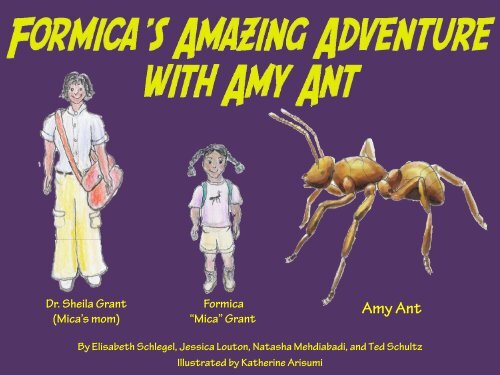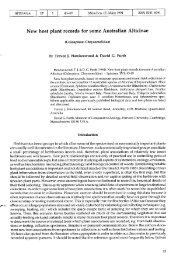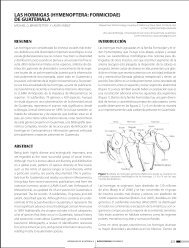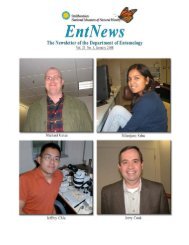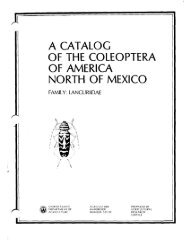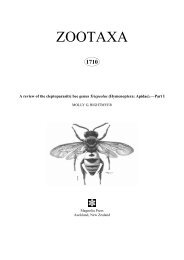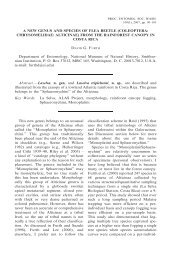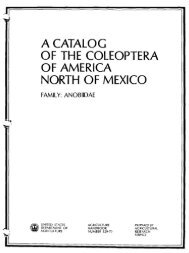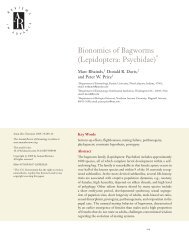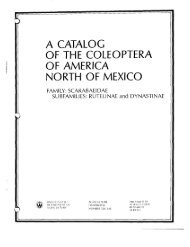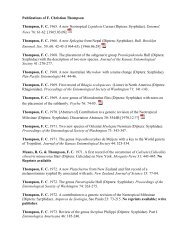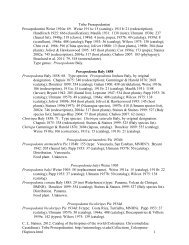Ant story - Smithsonian, National Museum of Natural History ...
Ant story - Smithsonian, National Museum of Natural History ...
Ant story - Smithsonian, National Museum of Natural History ...
Create successful ePaper yourself
Turn your PDF publications into a flip-book with our unique Google optimized e-Paper software.
Dr. Sheila Grant(Mica’s mom)Formica“Mica” GrantAmy <strong>Ant</strong>By Elisabeth Schlegel, Jessica Louton, Natasha Mehdiabadi, and Ted SchultzIllustrated by Katherine Arisumi
Dr. Grant: <strong>Ant</strong>s are not boring to scientists hereat the <strong>Natural</strong> Hi<strong>story</strong> <strong>Museum</strong>.There are a lot <strong>of</strong> useful things we can learn bystudying ants.Dr. Nate Adenine uses genes in ants to discoverwhat species they are and how ant speciesevolved from ants that lived withthe dinosaurs.Dr. Addison Acacia studies theinteraction between plants andants.I study the outsidecharacteristics (morphology)<strong>of</strong> ants so I can identifywhich species it is andhow it is related toother ants.
Mica: Whatever, mom. I still think ants are boring. All they do is crawl on your picnicfood and on you. Why would anyone want to study ants?..zzzzzzz…Amy <strong>Ant</strong>: Youwill know soonwhy ants shouldbe studied.See you soon…
Mica: Mom? Where am I?Oh no!What is that?Help me please!Somebody!Amy <strong>Ant</strong>:Where are you?Mica: Over here!Please hurry!I am about to fall in!Page 4
Mica: Thank you. What was that thing you saved me from?Amy <strong>Ant</strong>: That was an antlion. They build traps for ants and if we fall in they eat us.Mica: Oh no, I was veryclose to falling in.Thank you…excuse me,but what are you doing?Amy <strong>Ant</strong>: My, my,you are the oddest antI have ever seen.Mica: Silly, I’m not anant. I’m a girl.My name is Formicabut people call me Mica.Why are you putting your antennae on me?Amy <strong>Ant</strong>: <strong>Ant</strong>s use chemicals and scent (pheromones) to communicate.This is my way <strong>of</strong> saying hello and getting to know you.
Mica: Well it is an odd way <strong>of</strong> greeting new friends. Where am I?Amy <strong>Ant</strong>: You are in my nest.I brought you here to learn aboutants. <strong>Ant</strong>s are more ecologicallyimportant than you think.Some ants grow fungus to feedthe colony.Some ants harvest seeds.Some ants herd other insectsthat provide food for the ants.Some ants live on other animalsand protect them fromparasites.Mica: Wow, I did not know thatants were so important.How is an ant colony started?
Amy <strong>Ant</strong>: We have onequeen who started thenest and is mother to all<strong>of</strong> us.Mica: You mean every antin the nest is your brotheror sister?WorkersAmy <strong>Ant</strong>: Yes.Mica: But some <strong>of</strong> themare larger than you andsome have wings.MinorAmy <strong>Ant</strong>: That is becausethere are several differentkinds <strong>of</strong> ants (castes). Iam a minor worker ant. Myjob is to care for mysisters (a eusocialbehavior).Page 7
Amy <strong>Ant</strong>: The larger worker ant without wings is a soldier.She is larger because shedefends the nestwhen needed.The group <strong>of</strong> mysiblings with wings arereproductives. Thisgroup contains bothmale and female ants.When they mature,they leave the nest tomate withreproductives fromother colonies.FemaleReproductivesMaleThe females in thiscaste set up new antcolonies and becomequeens. The males donot live very long aftermating.Major (soldier)WorkersPage 8
Amy <strong>Ant</strong>: An ant’s life begins as an eggwithin a reproductive female ant. If anegg is fertilized it becomes a new femaleant. If not fertilized, the egg becomes amale ant.AdultPupaLarvaAs the egg matures, it becomes a larvaand is tended by workers who provide thelarva with food. The food provided to thefemale larva determines if it is a queen,soldier, or worker later in life.As the larva grows, it becomes a pupa.The pupa then develops into an adult.Mica: What kind <strong>of</strong> food do ants eat?EggPage 10
Amy <strong>Ant</strong>: Most ants arepredators or scavengersbut some ants eat fungusthat they grow in theircolony. Leafcutter antscollect fresh leaves, bringthem back to their nest,and break these down intosmaller pieces. These smallpieces are used as a mulch(substrate) for the fungus.Mica: Wow, some ants arefarmers!Page 11
Amy <strong>Ant</strong>: Some members <strong>of</strong> ahoneypot ant colony fill theirstomach (abdomen) with food(flower nectar and othersweet substances) untilswollen. The other ants thenreceive food from the swollenants.Other ants “milk” plant lice(Homoptera,including aphids)for the sweet nectar the liceprovide. This nectar is sodelicious some ants tend thelice, like farmers tend cows orpigs.Mica: It seems like ants reallylike to eat sweet things. I havesome cake in my backpack.Would you like some?Amy <strong>Ant</strong>: This cake isdelicious!Page 12
Mica: I will be sure to sharesome <strong>of</strong> my cake with antsoutside my home.Amy <strong>Ant</strong>: Now that you knowall about ants you are readyto go back to the museum.Mica: But I had so much funhere. Can’t I stay and help?Amy <strong>Ant</strong>: You can always visitthe <strong>Smithsonian</strong> ants in theInsect Zoo and visit yourmom’s <strong>of</strong>fice to see her livefungus-growing ant colony.Time to wake up…Page 13
Dr. Grant: Time to wake up Mica.Mica: Mom? Oh mom, I justhad the most amazingadventure! I was an ant.Well, not really. I was antsize and talked to Amy.Dr. Grant: Who?Mica: The worker over there.Where did she go?Dr. Grant: You have a greatimagination.Mica: No mom, it was real.Dr. Grant: Come on, dear.Let’s go to lunch.Page 14
Dr. Grant: Now Mica, tell meabout this dream?Mica: Mom, it wasn’t a dream.<strong>Ant</strong>s are so cool. I went to acolony. I almost was eaten by anantlion but Amy rescued me. Iwas sniffed and told I was anunusual ant. I learned all aboutant castes, life cycles, and antsocieties.Dr. Grant: Wow! Soundsincredible!Mica: Do we have any cake left?Dr. Grant: Why?Mica: I was going to feed it to theants.Dr. Grant: That sounds like awonderful idea, but only feed theants outside.Page 15
Mica: Oh mom, this is so great!<strong>Ant</strong>s love sweet food andAmy loved this cake.Dr. Grant: Make sure not to touchthe ants. <strong>Ant</strong>s can bite and someants sting when they are disturbed.What else did Amy tell you?Mica: Lots <strong>of</strong> things. How some antsgrow fungus, how ants help otherinsects and animals, how ants livetogether and care for each other.I feel as if I know tons <strong>of</strong> informationabout ants.Dr. Grant: The <strong>Smithsonian</strong> hasseveral activities for kids on ants. Doyou want to print out and do theactivities?Mica: Sure, that sounds like fun!Goodbye Amy <strong>Ant</strong>!Page 16
Acknowledgements• Eugenia Okonski• Stephanie Johnson• Jerry Louton• The SI <strong>Ant</strong>Lab• Department <strong>of</strong> Entomology• Alex Wild, www.myrmecos.net• This material is based upon worksupported by the<strong>National</strong> Science Foundationunder Grant No. DEB0949689.
See youlater!The End


